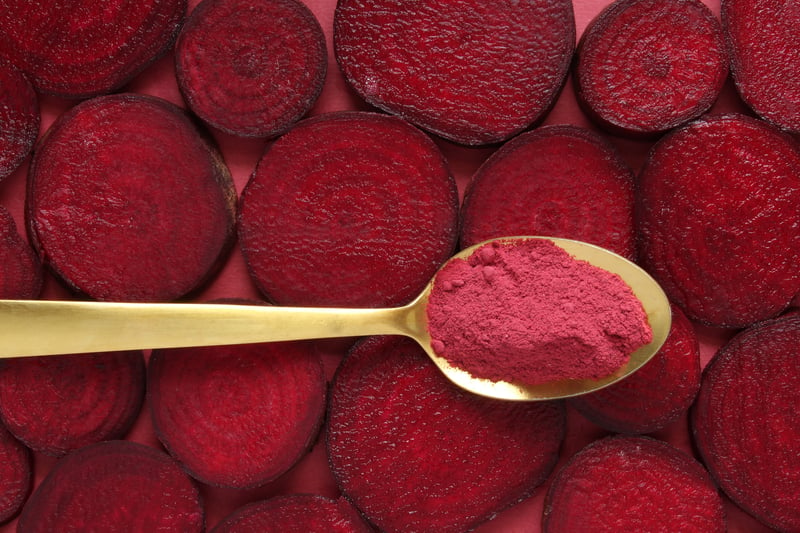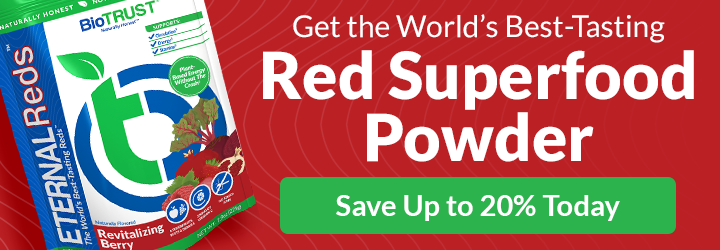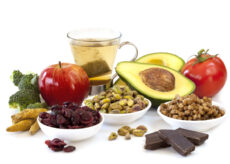See 7 Powerful Health Benefits of Beetroot Powder

A long, long time ago, Hippocrates is given credit with saying “Let food be thy medicine.” Since that time, we’ve continued to better understand how important food is to our overall health and well-being. One humble root has been used as a natural plant “medicine” since Roman times. It’s nutrient-dense, easy-to-grow, affordable, and quite versatile. What plant? Beets, of course. Today, however, it’s gaining new popularity with its even more versatile, convenient version: beetroot powder.
What are the benefits of beetroot powder? And how can you include it as part of your health-optimizing diet. Let us count the ways.
But first…
What is Beetroot Powder?
Basically, beetroot powder starts by dehydrating sliced or diced beetroots or red beets. This process removes the moisture, so the root can be ground down into a fine powder. Beetroot, of course, has a distinctly earthy taste that’s loved by some yet can be unappealing to others. If you’re in the latter group, you’ll be glad to know that the drying process helps neutralize much of the earthy flavor. So, when the beetroot powder is added to recipes, it provides plenty of color but will likely be more palatable. Do note, however, that beetroot is fairly sweet naturally (it has the highest sugar content of any vegetable), so take that into account if you cook or bake with it.
Is beetroot powder as healthy as straight up beetroot? While there are benefits to both forms, research indicates that powdered beetroot has a higher antioxidant potential than cooked beetroot. 1 In addition, beetroot powder is more concentrated, so you can get more of the nutrients with a smaller serving size. For example, a teaspoon of beetroot powder would provide around the same amount of nutrients (sans water and some of the fiber) as one full beetroot.
7 Benefits of Beetroot Powder
1. Provides a Wealth of Vitamins and Minerals
Beets have been called “nature’s multivitamin” as they provide a variety of nutrients—nearly all of the vitamins and minerals we need. 2 This includes folate (20% of the recommended daily intake or RDI), manganese (16% of RDI), potassium (9% of RDI), iron (4% of RDI), and vitamin C (6% of RDI) as well as nitrates, antioxidants, and polyphenols.
Vitamin C has numerous positive effects in the body, including the synthesis of collagen, protein metabolism, and wound healing, and our bodies aren’t able to make it, so it must be obtained from the diet.
Folate is another nutrient the body needs for a variety of roles, including production of healthy red blood cells and cellular growth.
Beets are also high in antioxidants like alpha-lipoic acid, which has been found to help lower blood sugar and increase insulin sensitivity. 3
A quality beetroot powder can be added to a variety of foods to up the nutrition. For example, add it to a smoothie, a glass of juice, a bowl of oatmeal, or to cold water for a refreshing, health-promoting drink on its own.
2. Support Healthy Circulation and Blood Pressure
One of the most popular reasons to choose beetroot juice or beetroot powder is because it’s rich in nitrates. Nitrates, in turn, are well-known for their effects on healthy blood circulation by helping the muscles around arteries and veins relax, so blood vessels can relax and allow greater blood flow. 4 This can then help decrease blood pressure.
3. Supports Cardiovascular Health
If you didn’t know, heart disease is the number one killer worldwide. That includes heart failure, heart attacks, and stroke. 5 And one of the most prevalent risk factors is hypertension (aka high blood pressure). While most of the research is for beets or beetroot juice (rather than beetroot powder), there is strong evidence that this food can help lower blood pressure by up to 10 mmHg in just a few hours. 6
Again, this effect appears to be due to the nitrates found in beetroots, which helps dilate blood vessels, leading to the decrease in blood pressure. 7
While beetroot has been shown to quickly help reduce blood pressure, the effect also appears to be only temporary. So, to enjoy the heart-healthy benefits from the nitrates in beetroot, they need to be consumed regularly. 8
4. May Enhance Exercise Performance
Beetroot juice has been shown to help improve cardiorespiratory endurance and efficiency as well as increasing time to exhaustion in hard-training athletes. In addition, nitrates may help support stronger muscle contractions, which may also help optimize athletic performance. 9, 10 Plus, nitrates may improve the efficiency of mitochondria. Mitochondria are needed for cell energy, so this may also help boost performance. 11
Research has found that beetroot does impart performance benefits for runners as well as cyclists. 12 For example, runners may extend time to exhaustion by up to 25% during high-intensity workouts. 13 And cyclists were able to increase oxygen use by up to 20%. 14, 15
For best results, consume beets, beet juice, or beet juice powder between two and three hours before a training session or competition. 16
5. May Support Balanced Inflammation
As a rich source of antioxidant phytonutrients like vulgaxanthin, betanin, and isobetanin, beetroot powder may support a healthy, balanced response to inflammation. Betalains in particular provide the vibrant red color many associate with beets (i.e., “beet red”), which may help reduce oxidative stress and support the body’s natural detoxification process via the liver and kidneys. 17, 18
One study gave beetroot concentrate to folks between the ages of 45 and 65 who were experiencing knee discomfort. When compared to another group receiving a placebo, the beetroot group reported 27% improvement in joint function. 19
Eating foods in general that are high in antioxidants, such as a rainbow of vegetables and fruits, has been shown to help delay cell damage and reduce chronic inflammation and thus reduce the risk of chronic diseases. 20
BREAKING: Forget Taking Collagen, Try This 21-Second Trick for Healthier Skin & Hair Instead
6. May Help Promote Brain Functioning
Because of the potential for beetroots to support increased blood flow, it’s only natural that it may help support brain functioning. That is, nitrates may help dilate the blood vessels delivering blood to the brain as well as the rest of the body. And research has, in fact, demonstrated that beets may help improve cognitive functioning, including executive function, working memory, task-switching, and reaction time. 21, 22
7. May Support Skin Health
Likely because of its high vitamin C and other antioxidant content, beetroot may be good for the skin. Some purported benefits include protecting against signs of aging (e.g., wrinkles), fighting acne, and helping the skin look bright and fresh. 23
Are There Any Side Effects?
While it appears safe to consume beetroot powder daily, it’s recommended to consume no more than five grams. This is because for people who may be predisposed to kidney stones, there may be an increased risk as beets are high in oxalates. For most healthy people, oxalates aren’t an issue, and beets as well as beetroot powder can be part of most healthy diets. 24
The biggest “side effect” from consuming beets or beetroot powder may simply be that it can color your urine, so don’t be alarmed if you notice that type of change.
Fortunately, beetroot powder has not been shown to interact with medications.
Some of the benefits of beetroot powder over beet juice are that it’s lower in sugar and overall calories, which is helpful for people looking to lose or maintain weight. Beetroot powder is also easy to consume, highly versatile, and easy to add to just about any diet. It’s also highly concentrated, so you get more beet for your buck (so to speak).
Benefits of Beetroot Powder: Recap
If you’re looking for a nutrient powerhouse, you can’t go wrong with nature’s multivitamin. This humble root doesn’t get nearly the credit it deserves. Beetroot powder provides a wealth of benefits. Just toss a scoop in your water bottle, into a smoothie, or into a variety of recipes to increase the nutritional value.






